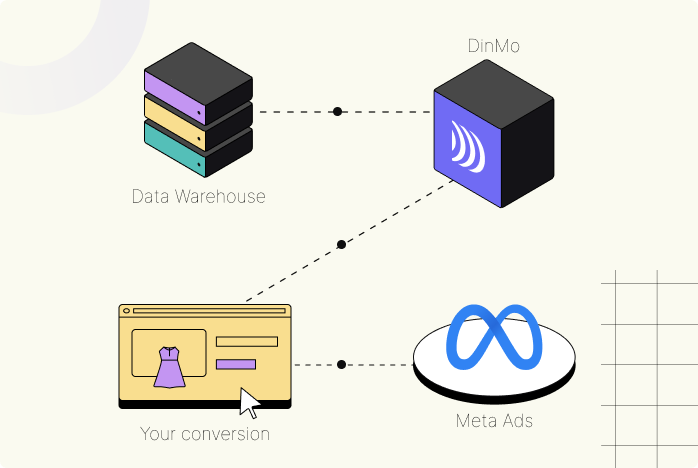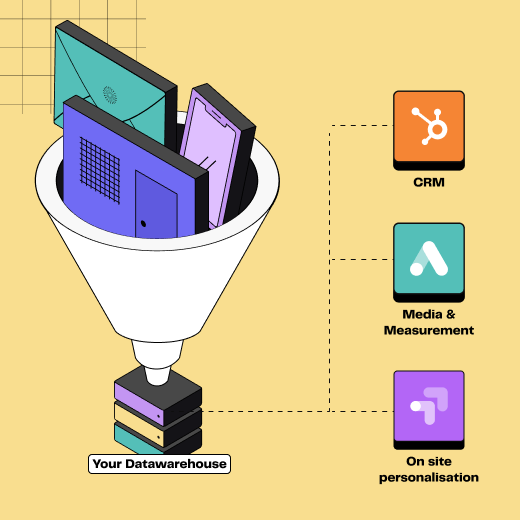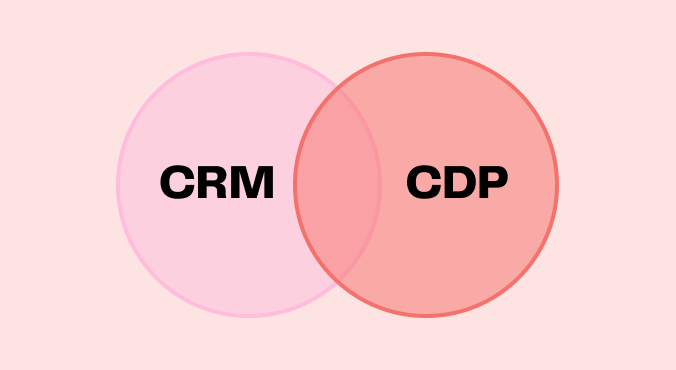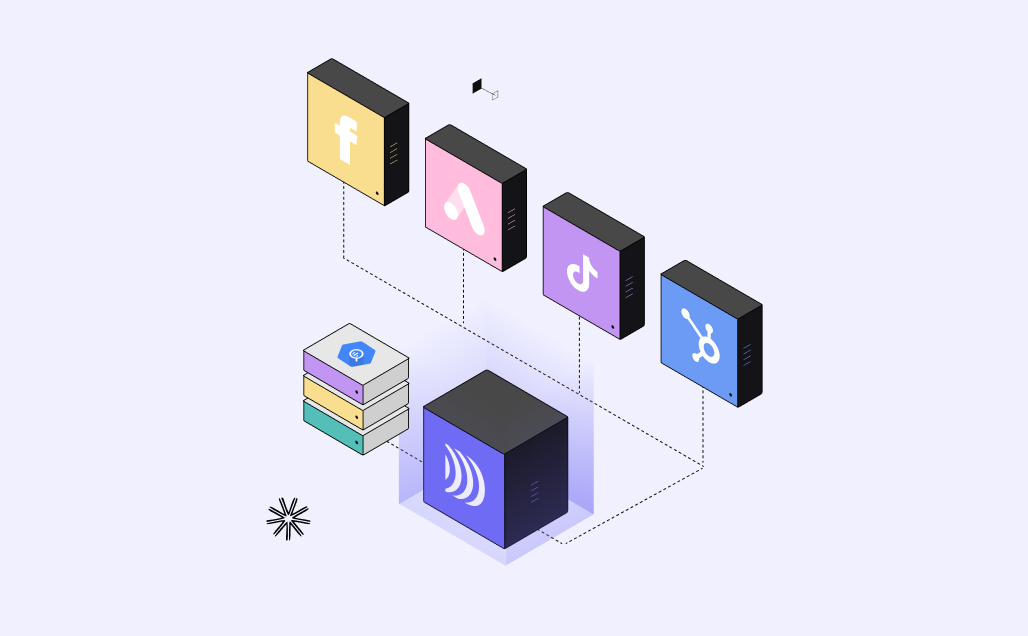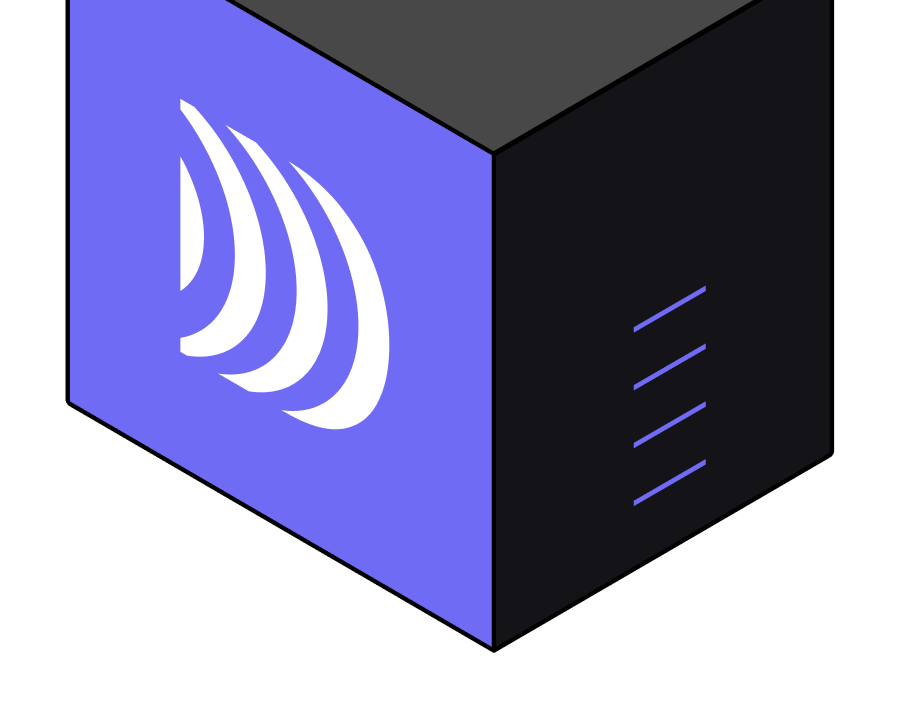The gradual disappearance of third-party cookies has had a significant impact on advertisers' acquisition costs on major platforms like Meta Ads and Google Ads. This impact is estimated at 20 % today and could reach up to 50 % by the end of 2024.
To cope with this technological shift, almost all advertising platforms have developed Conversions APIs. These tools allow advertisers to share conversion events from their leads and their customers. However, these APIs are still relatively new, and their implementation can often be complex.
This guide is tailored for those seeking to master the Meta Ads Conversion API, offering a strategic advantage in navigating the evolving digital advertising landscape.
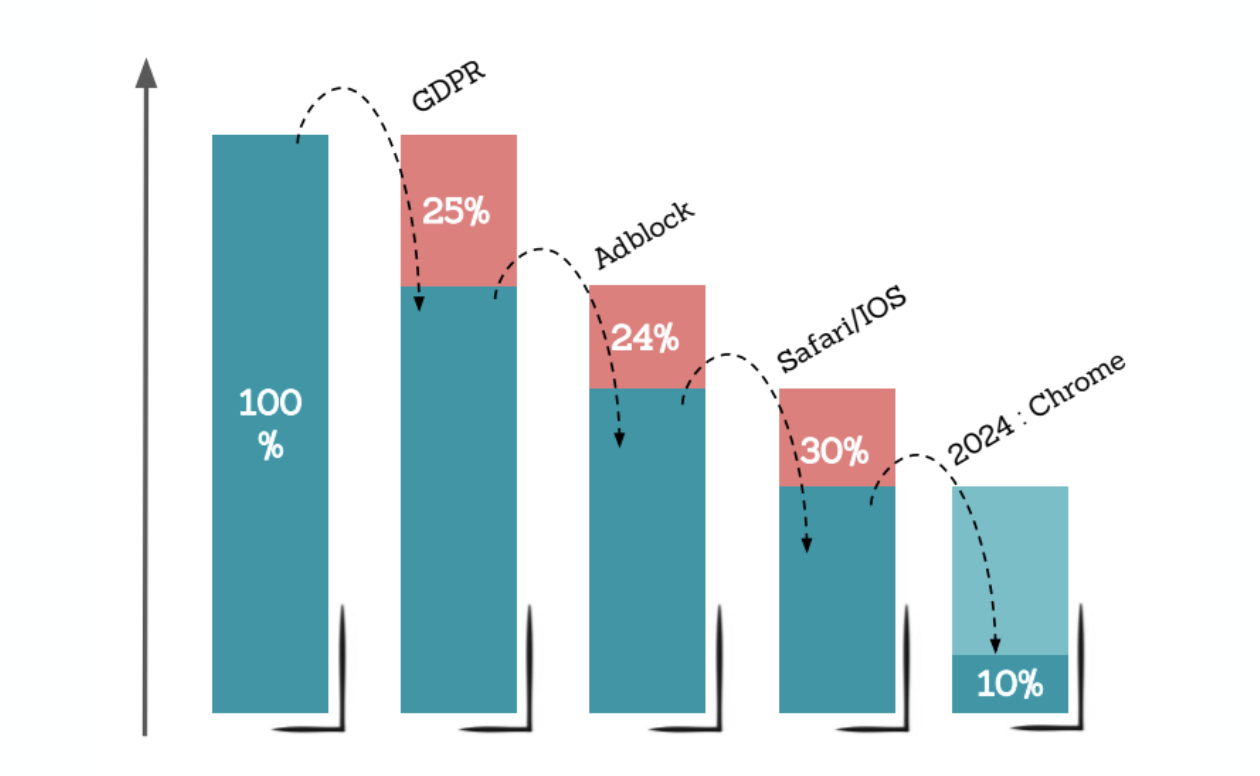
The imminent end of 3rd party cookies
This article is just a brief summary of everything you need to know about Meta Conversions API. If you're looking to deepen your understanding of Meta's Conversion API and its strategic benefits, our e-book offers comprehensive insights.
Download here 👇
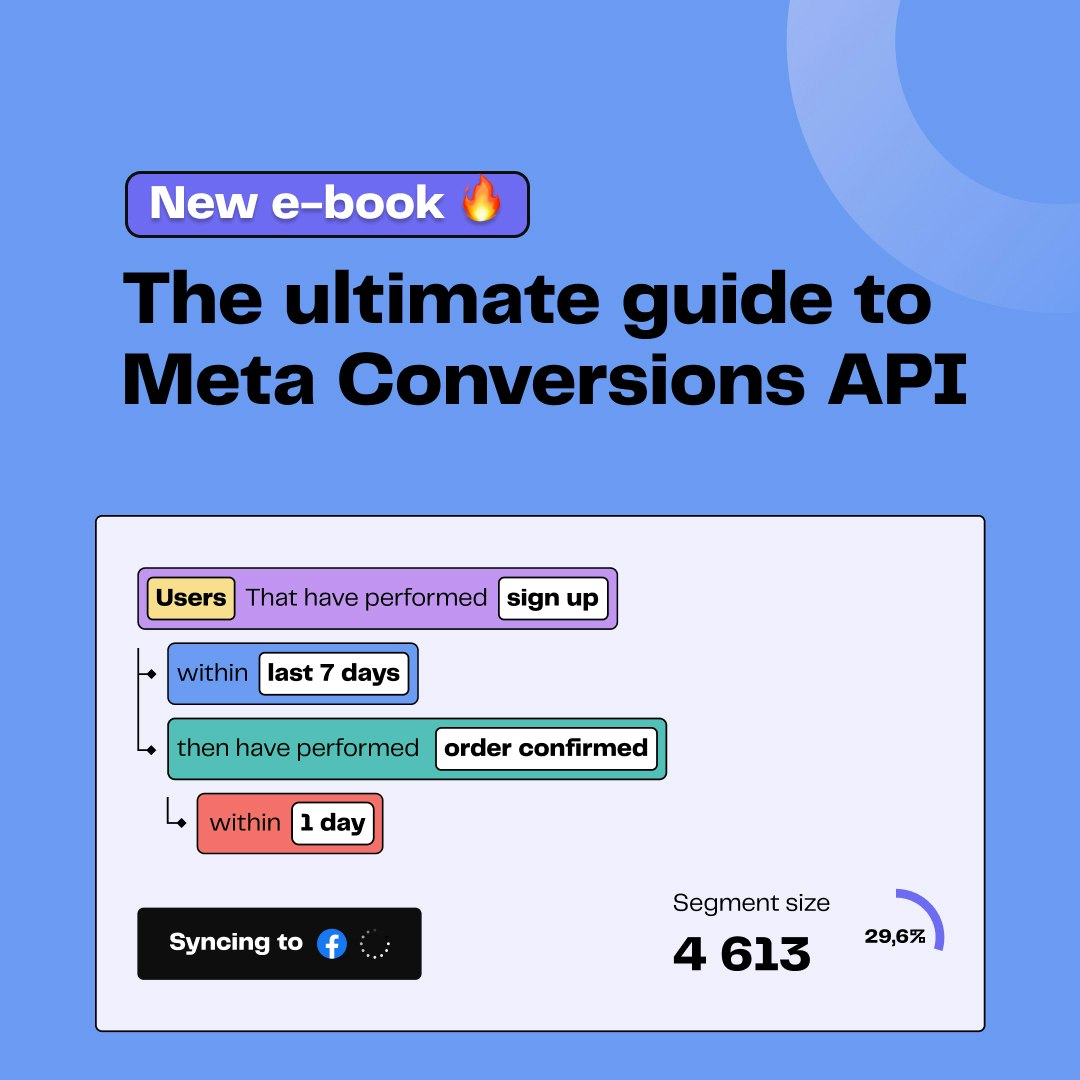
The ultimate guide to Meta Conversions API
Everything you need to know to successfully implement CAPI
Sending Conversions: Why It's Important?
Ad platform algorithms are designed to optimize the performance of your advertising campaigns based on the goals you've set. These goals can vary from increasing brand awareness to direct conversion (purchases, sign-ups, etc.). Algorithms use a variety of signals to achieve these goals. Conversion events are among the most critical data because they best qualify your target audience.
Without precise event tracking, the algorithm wouldn't have the necessary information to effectively target users, potentially leading to unnecessary expenses. A typical example is ads continuously delivered to a customer after a purchase. The platform may not know that the user has converted, continuing to identify him as a high-potential buyer because he previously interacted with the ad.
In short, Conversions APIs offer several benefits, including more precise event tracking, better attribution, and increased compliance with privacy regulations. In the current context of the disappearance of third-party cookies, they become an essential tool for capturing the entire life cycle of your customers, whether they are new or returning.
Tracking Events via the Conversions API
Historically, conversion event tracking was based on the use of "Pixel Tracking" (aka. a Facebook tag), the famous javascript code that advertisers installed on their websites directly or via Tag Management Systems. But for two years now, and in particular following the release of iOS14, Meta has been offering the possibility of using a direct upload of conversion events from advertisers' servers.
Traditional pixel based tracking is problematic today for several reasons:
Disappearance of third-party cookies
Privacy regulations (GDPR and CCPA)
Data limitation (only online events)
Performance problems (Pixel may slow down a site's loading time)
Unlike traditional pixel-based tracking, Meta Ads' Conversions API allows direct tracking from your server.
This means that every time a user takes action on your website or application, this data is sent directly from your server to Meta Ads, bypassing the user's browser. Then, opting for tracking via the Conversions API enables more precise and reliable tracking on your website, overcoming technological and regulatory constraints.
But the Conversions API doesn't stop there. It also allows you to track a much wider range of events, including those occurring outside your website, such as in-store purchases or interactions in a mobile app. With more precise and comprehensive data, you can create more segmented audiences for targeted advertising campaigns.
In short, the Meta Conversions API is designed to provide more reliable tracking in environments where cookies are restricted, offering a more privacy-compliant way of tracking conversions without relying on browser-based cookies.
However, Meta recommends the implementation of both client-side (via pixel) and server-side tracking to maximize performance. This is due to several reasons, with the main one being that Meta Ads uses matching keys that are not yet collectible via server-side. In particular, some keys associated with events and allowing the recognition of the user initiating the action cannot yet be collected by server-side, such as fbp and fbc.
How to Perfectly Implement Meta Ads CAPI?
To take full advantage of all the benefits of Meta's Conversions API, it is important to properly prepare the groundwork in advance to ensure a perfect implementation that allows you to prepare for the future of online advertising.
Here, we provide you with the 5 necessary steps to implement Meta Ads Conversions API:
Choosing Events to Send to Meta
A customer's buying journey can be broken down into several stages, from discovering your product or service to making a purchase. As you progress through the funnel, the buying intent increases.
Implementing CAPI for events that are most important to you and on which you want to optimize your campaigns is crucial.
Take the example of a B2B company using Facebook to generate leads through forms. Only 20% of obtained leads are genuinely qualified. The company wants to transition from lead management to qualified lead management. To achieve this, it must send events transforming a lead into a qualified lead via the Conversions API. The algorithm will then optimize campaigns to reach more qualified leads.
It's exactly what we've done with Nexity!
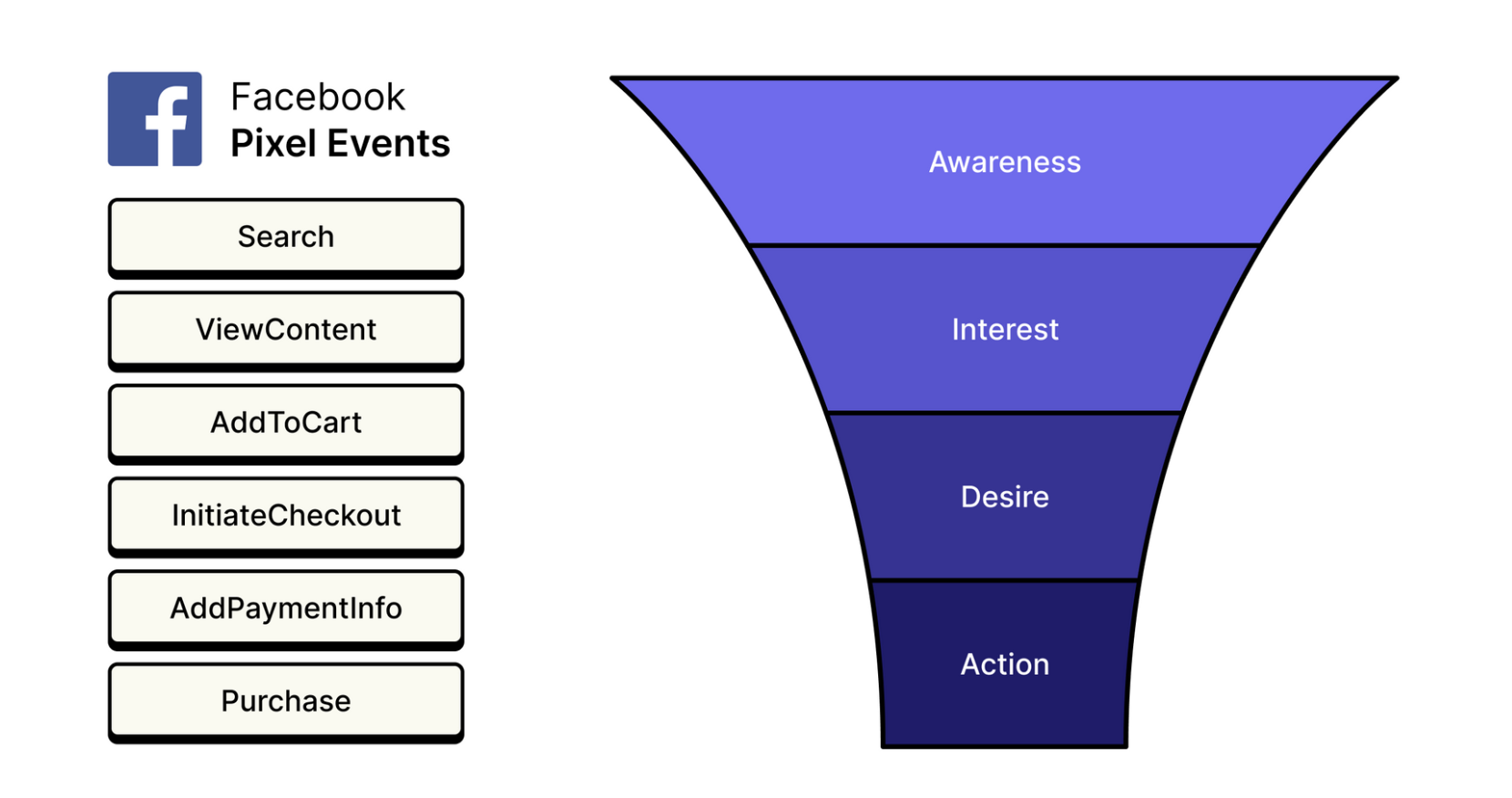
Most valuable conversions are at the bottom of the funnel
Collecting Your Events Server-Side
Once your funnel is defined, it's essential to ensure that you can collect these events from your server. For offline events, it's necessary to collect and centralize them in a data warehouse regularly.
Attention, for all types of events, it's important to ensure to collect first-party data, such as email or phone number, to enrich your events and allow Meta to recognize profiles on its platform. The complete list of customer identifiers accepted by Meta is available in the official documentation.
Choosing the Appropriate Integration Solution
Firstly, there are integrated options like Shopify, GTM Server Side, or CAPI Gateway. These are solutions that manage both the collection of online data server-side and their sharing with advertising platforms. These solutions are suitable for companies with a simple customer funnel and 100% online conversions.
However, in many cases, you're not only tracking interactions on your website. Event tracking is often distributed among multiple touch points and can be used to fuel your business:
Lead events in the CRM
Product usage events in your product backends
Engagement events in your analytics tool
In-store purchase events in your offline databases
All this data is necessary to reconstruct your customers' journey. To address this challenge, we recommend centralizing all your conversion data, regardless of its origin, in a cloud data warehouse such as BigQuery or Snowflake. This allows you to have a single source of truth for the customer journey, including both online and offline events.
It also allows you to use first-party information available only in your back office or CRM (external id, Country, City, etc.), which can significantly improve matching rates.
Sending data from your data warehouse to Meta can then be done through Reverse ETL solutions (for tech teams) or composable CDPs (for business teams).
DinMo allows to connect your data warehouse to your Facebook account in just a few minutes.
💡You might be wondering: what if my company builds a custom integration between my data warehouse and Meta? On the surface, it seems feasible. Yet, Meta is continuously evolving its Conversions API to address the challenges of server-side tracking, including enhancing the collection of matching keys to improve accuracy and privacy compliance. This means investing in technical support to set up and maintain the API to accommodate changes.
Ensuring Implementation Quality
Monitoring Pixel vs. Server Event Count, Event Match Quality (EMQ), and Event Deduplication are essential for assessing the effectiveness of your CAPI implementation.
Pixel vs. Server Event Count: By implementing the Meta Ads Conversions API in addition to pixel tracking, you can see the number of events received from each source. Make sure you have at least the same number of events from the server as you receive from the pixel.
Event Match Quality (EMQ): This KPI represents the matching rate between sent conversions and Facebook users. The more personal information you send about the customers who performed the events, the higher the score. To find it, simply go to your Facebook Event Manager and click on the score of your events.
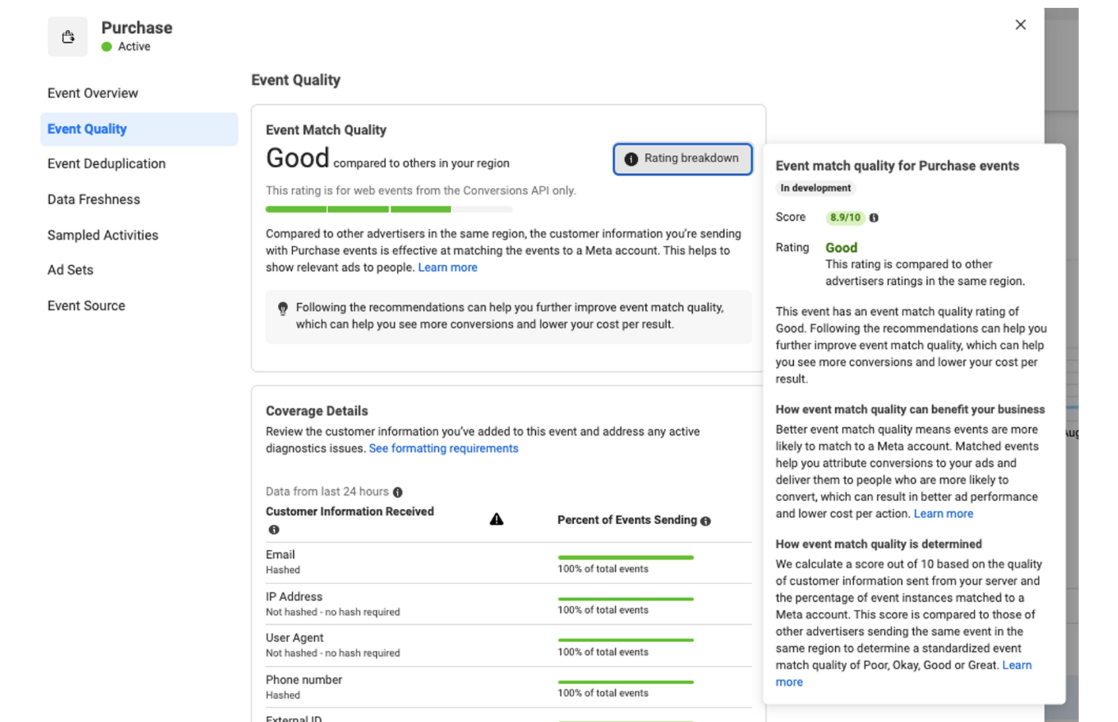
EMQ Score Example
Event Deduplication: If you connect your web events via both the pixel and the Conversions API, Meta can receive the same events from both the browser and the server. If Meta determines that the events are identical and therefore redundant, the platform will keep one and ignore the others. This is called deduplication. You can see the deduplication quality by looking at the event details in your event manager. Meta requires a match of over 70%.
You can check which events are deduplicated using the event test tool in Meta Events Manager.
To validate the overall quality of the implementation, Facebook will display the number of additional conversions attributed to the Conversions API implementation for each event. On average, you can expect +20% conversions for Purchase events.
As third-party cookies phase out, embracing Meta's Conversion API and similar technologies is crucial for maintaining a competitive edge in online advertising.
Why and How to Act Now?
The disappearance of third-party cookies is imminent, and addressing its impact is vital for companies operating online. Advertisers who quickly adopt new technologies and best practices will have a lasting competitive advantage.
Embracing Meta's Conversions API is not just about adapting to technological changes; it's about seizing the opportunity to refine your advertising strategies for superior performance and privacy compliance.
If you haven't yet considered how Meta Conversions API (or any other Conversions APIs of an advertising platform) can benefit your business, now is the time to do so. If you want to learn more about our approach, feel free to contact us.
FAQ
Do you have some case studies?
You can directly consult what we've done with Diptyque (+67% Reported Purchases) or consult the Meta documentation, where Facebook put together some useful case studies about CAPI.
How Composable CDP solutions are better than server-side with GTM?
Server-side GTM necessitates that customers set up their own tracking servers on Google Cloud. This is a complex process that requires developers for both initial launch and ongoing maintenance. In contrast, Composable CDP solutions work automatically. We manage updates in the background, take care of hosting, and uphold the connection for improved consistency and reduced ongoing costs.
What exactly can I track?
All standard events are available in the official Meta documentation. With DinMo, you are no longer limited to standard Meta events and can track your entire customer journey by sending custom events.












